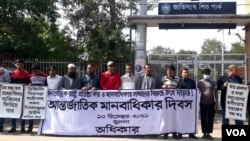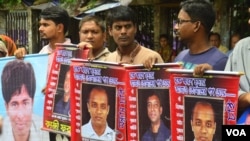Activists and human rights groups in Bangladesh are raising alarms over the government's culture of impunity for human rights abusers, as detailed in the U.S. State Department’s recently released annual human rights report.
Bangladesh made no significant progress in improving its human rights situation, the department said in its 2023 Country Reports on Human Rights Practices.
The report said arbitrary killings, enforced disappearances and torture by government forces persisted throughout the past year. It also highlighted additional concerns, including harsh prison conditions, arbitrary arrests and a lack of judicial independence.
Reacting to the report, Nasiruddin Elan, a director of Odhikar — a human rights organization known for documenting thousands of alleged extrajudicial killings and enforced disappearances in Bangladesh — said, “These reports raise public awareness, making people more informed and aware about the issues, which is essential.”
In 2022, Bangladesh’s government accused Odhikar of spreading “propaganda against the state by publishing misleading information,” leading to the revocation of its operating license and criminal charges against Elan and Adilur Rahman Khan, the founder and secretary of the organization.
Elan and Khan were sentenced to two years in prison in September 2023 following a trial widely criticized as “politically motivated” by campaigners. Both are currently out on bail.
“The findings of the [State Department] report are not surprising to me. We are in a state where democracy is completely absent, and governance is increasingly autocratic. Under such conditions, those in power will show little regard for human rights. They have no reason to try [to] improve the human rights situation,” Elan told VOA.
Shahdeen Malik, a prominent Bangladeshi lawyer and human rights activist, expressed concern over the culture of impunity highlighted in the report, noting that it has created a dire situation where citizens have no recourse or means to seek remedy if they become victims of wrongdoing.
“It's a telltale sign of a dictatorship when the system disregards human rights, stifles freedom of expression and quashes rights movements,” Malik told VOA.
He believes targeted sanctions against high-ranking officials or visa restrictions might compel the government to address the human rights abuses by its agents.
In December 2021, the U.S. placed sanctions on the Rapid Action Battalion (RAB), an elite unit of Bangladesh’s police force, and six of its current and former officers. The sanctions were imposed because of the RAB’s alleged involvement in many extrajudicial killings and forced disappearances.
“The seemingly autocratic government now ignores pressure from civil societies and rights activists. The international community could implement targeted actions to punish the wrongdoers. However, it is important to remember that broader trade sanctions would ultimately harm the general population,” Malik said.
A 34-year-old opposition political activist of the Bangladesh Nationalist Party (BNP), who asked to remain unnamed for fear of repercussions, said the report revealed the “true face” of the current government led by Prime Minister Sheikh Hasina.
“To remain in power, the government has violated the human rights of opposition activists and the free press to an unthinkable extent. And the U.S. report has done a great service to the people of Bangladesh highlighting the dire state of the country’s human rights situation,” he told VOA via telephone from a northwestern district of the country.
He added that he currently faces nearly a dozen charges because of his involvement in BNP politics. The activist said that these charges have resulted in five incidents of imprisonment, but said he was currently out on bail. He denies the allegations, asserting that they are baseless and politically motivated.
The “international community and also the U.S. now must act on the findings of the report; like they previously imposed sanctions on the RAB forces, they should hold the human rights abusers accountable,” he said.
Bangladesh’s Ministry of Foreign Affairs did not respond to VOA’s calls, messages and email requests for comment. However, during a media briefing in April, the ministry criticized the U.S. assessment, saying the report did not accurately reflect the situation on the ground and claimed it was based on “isolated and unfounded allegations.”
"It is also apparent that the report mostly relies on assumptions and unsubstantiated allegations drawn from local and international nongovernment organizations (including anonymous sources), many of which are supported by the U.S. government or related entities,” ministry spokesperson Seheli Sabrin told journalists while reading from a statement on April 25.
Extrajudicial actions
Citing data from a prominent local human rights organization, Ain o Salish Kendra (ASK), the State Department report noted that although there was a reported decline in extrajudicial killings from the previous year, ASK's records indicate that from January to September 2023, eight individuals died under questionable circumstances. That includes two deaths in shootouts and three from physical torture, either before or while in custody.
This number, however, represents a decrease from the 12 incidents reported in the corresponding period in the previous year.
The department’s report also points out that enforced disappearances, mostly targeting “opposition leaders, activists and dissidents,” orchestrated by or on behalf of government authorities, continue unabated, with security services frequently implicated. According to an unnamed local human rights group cited in the report, from January to September 2023, 32 individuals became victims of enforced disappearances.
The report said, “There were numerous reports of widespread impunity for human rights abuses. In most cases, the government did not take credible steps to identify and punish officials or security force members who may have committed human rights abuses.”
Suppressing freedom of expression
The report noted restrictions on freedom of expression and media freedom, including violence or threats against journalists, unjustified arrests or prosecutions, censorship and the use or threat of criminal libel laws to curtail free speech.
It also criticized the Digital Security Act, or DSA, a law enacted in 2018 that has long been termed by rights activists as “draconian” for its misuse by the government to suppress dissent and freedom of speech.
“The law was used against speech found on social media, websites and other digital platforms, including for commentators living outside of the country,” the report said.
Bangladesh enacted a modified version of the DSA last year, now named the Cyber Security Act. Rights activists maintain it remains as repressive as its predecessor.






